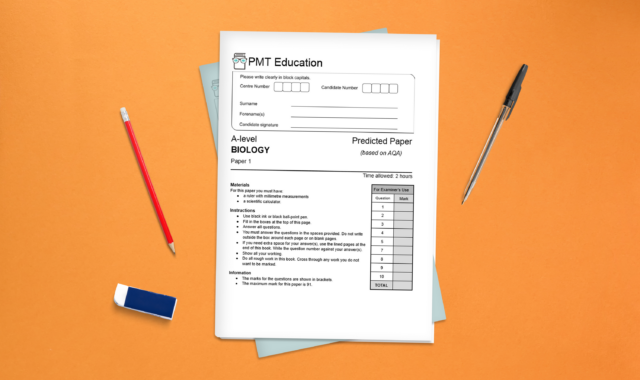Contents:
As exam season draws near, it’s crucial to make the most of your revision time. One valuable tool that can aid in your exam preparation is predicted papers. Designed by experienced educators, these papers offer a snapshot of what you might encounter in your real GCSE or A Level exams. In this article, we’ll discuss how accurate predicted papers really are, why they’re useful, and how you can use them effectively.
What are predicted papers?
Predicted papers are exam-style papers created by experienced teachers and examiners. These experts analyse past exam papers and historical trends in the topics and questions that have been tested.
Exam boards follow a five-year rule, requiring all specification points to be assessed within a five-year period. This means that if a topic hasn’t been assessed in recent years, there’s a high chance it will appear in this summer’s exams. Additionally, topics that are core to the specification and regularly appear year after year are also expected to make a reappearance.
Experts who create GCSE and A Level predicted papers use this information to forecast which topics are most likely to feature in your exams. They then craft a paper that mirrors the style, format, and difficulty of the actual exam you’ll be sitting.
Are predicted papers accurate?
One of the most common questions students ask is how accurate predicted papers really are. Before we answer that, it’s important to remember that exam papers aren’t meant to be completely predictable. If they were, they wouldn’t be a good test of your knowledge or skills!
Predicted papers are created with a high level of expertise, drawing on a detailed analysis of past exam paper trends. The accuracy of a predicted paper can vary depending on several factors:
- Author: The quality of a predicted paper relies heavily on the experience of the author and the depth of their past paper analysis. An experienced teacher or examiner can spot recurring patterns, identify key topics that frequently appear, and predict the areas most likely to be tested with greater accuracy.
- Subject: Some subjects are easier to predict than others. For example, maths and the sciences often follow more structured patterns, with recurring question types and key topics that are regularly assessed. In contrast, subjects like the humanities, which involve broader content and more open-ended questions, can be more challenging to predict.
- Newness of the specification: Predicted papers depend on past patterns. For newer exam board specifications where there are fewer past papers available, it’s more challenging to create accurate predicted papers, as there is less historical data to analyse.

All predictions are based on probabilities, and exams may still feature questions that deviate from these expectations. While predicted papers can’t predict every single topic that will appear on your exam, they offer an informed estimate of the areas most likely to be tested, helping to highlight key areas for focused revision.
Content aside, the format, question types, and wording of predicted papers are designed to accurately reflect the structure of a real GCSE or A Level exam paper, providing valuable practice and helping familiarise you with how questions will be presented on the day.
Why predicted papers are valuable
Predicted papers offer several key benefits that make them a valuable part of your exam preparation. Here’s why they are worth your time:
- Real exam format: Predicted papers mimic the structure of a real exam paper and the language used. This helps familiarise you with both the format and the types of questions that are likely to appear in the actual exam.
- Unique questions: Predicted papers feature completely unique questions that you won’t have encountered before. These differ from past paper questions, which you’re likely to have seen in mock exams, class tests, or during your revision. Sitting a predicted paper is one of the closest experiences to sitting a real exam, giving you a good idea of what to expect on exam day.
- Targeted revision: Sitting a predicted paper helps reinforce your understanding and highlights gaps in your knowledge, allowing you to focus your efforts where they’re needed most for more effective exam preparation.
- Refining exam technique: Predicted papers provide a valuable opportunity to refine your exam technique and time-management strategies. By self-marking using the mark schemes, you can familiarise yourself with the key terms and phrases examiners are looking for in your responses.

How to use predicted papers effectively
Predicted papers are a valuable tool, but like any revision resource, their effectiveness depends on how you use them. To make the most of predicted papers, it’s important to approach them strategically:
- Choose a reliable source: When selecting predicted papers, it’s important to choose a trusted source. Look for papers where the author’s expertise is clear, such as those created by experienced teachers or examiners. Some companies charge for predicted papers, while others offer them for free.
- Treat them like the real exam: To get the most out of a predicted paper, sit it under exam conditions. Set a timer, eliminate distractions, and complete the paper in one sitting, just as you would on the day of the actual exam. This will help you practise your time management and get used to the pressure of answering questions within a limited timeframe.
- Review and reflect: After completing the paper, don’t just throw it aside. Take the time to carefully review your answers. Predicted paper mark schemes closely mirror those used by examiners to assess real GCSE or A Level exam papers. Use the mark scheme to evaluate your responses, identify where you went wrong or missed out on marks, and understand why. If there are any specific questions you’re unsure about, seek help from a teacher or one-to-one tutor for further clarification.
- Focus on weak areas: Use the results of your predicted paper to identify specific topics or question types that require attention. If you struggled with a particular topic, review your notes and then practise additional exam questions. Physics & Maths Tutor offers exam questions organised by topic, allowing you to target your revision more effectively.
- Don’t rely solely on predicted papers: Use predicted papers as a supplement to your revision, not as the sole guide for which topics to revise and which to skip. For the most accurate representation of the exam format and content, prioritise official past papers provided by your exam board. These papers reflect the actual structure and wording of past exams, making them the best resource for knowing what to expect. Predicted papers should enhance your revision strategy, not replace it.

PMT Education’s predicted papers
To boost your revision, we have created predicted papers for a range of GCSE and A Level subjects and exam boards. By analysing past paper trends, our subject experts offer informed predictions to guide your revision and help you prepare effectively for your final exams. Visit our Predicted Papers Hub to find out more!
Predicted papers created by experienced educators can be a valuable resource to help you prepare effectively for your exams. While they aren’t a crystal ball, they offer realistic exam-style practice, enabling you to consolidate your knowledge and understanding, refine your exam technique, and target your revision where it’s needed most.





Comments